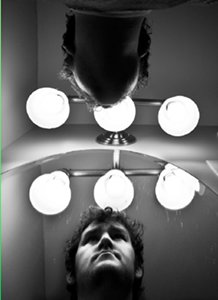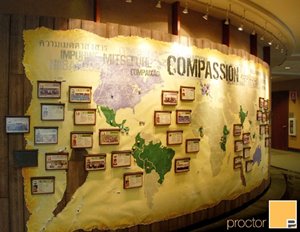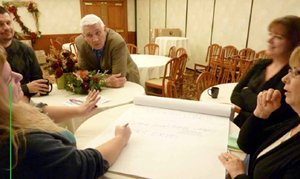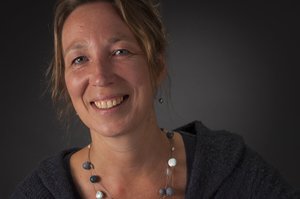Most organizational development and change programs start in a top-down way and focus on the “what” and “how” for the organization. But as we’ve seen in earlier articles about Theory U: the “who” of change makes the difference. The level of awareness of the participants of a system defines the outcomes of that system. It matters “who” you are: it defines the how and what you do, and it is crucial – it defines whether you have a workplace where people give their best – or not.
“If that stubborn coworker would only see that I have a point…. If my CEO would only let go of micro management….If the others would only change their ways….”

Organization development from within
Welcome to the Personal Development Program. If you become more aware of “who” you are and how you behave in various situations – you’ll see how other people respond to you. If you want to change anything – you now have the key: change your own beliefs and behaviors to change relationships at work.
This is organization development and change from within – by starting with the “who” instead of the outside change programs that focus on structures and recipes of “what and how”.
Mitzi Gras, a development facilitator is working for the Dutch ITIP institute. The ITIP created a personal development program for the expert advisors of the government organization “Province of Noord-Brabant” who administers this region in the Netherlands.
 A government organization like a Province is not a very dynamic environment as prejudice would have it. These organizations used to be hierarchies that are managed in a top-down way, governed by procedures and mindsets that favor control. Well, not this one…! The Province is aiming for a culture change that incorporates Ownership, Results and Accountability (which includes giving your coworkers constructive feedback instead of hiding behind procedures or silos). At this point, their staff has a lot of untapped potential – while they are intelligent and high-educated people.
A government organization like a Province is not a very dynamic environment as prejudice would have it. These organizations used to be hierarchies that are managed in a top-down way, governed by procedures and mindsets that favor control. Well, not this one…! The Province is aiming for a culture change that incorporates Ownership, Results and Accountability (which includes giving your coworkers constructive feedback instead of hiding behind procedures or silos). At this point, their staff has a lot of untapped potential – while they are intelligent and high-educated people.
The Province chose the ITIP to help them develop their organization’s culture – without defining outcomes in advance. The level of letting-go the Province exerted when engaging in this personal development program is a pleasant surprise and seems an exception, when compared with many other organizations.
Consciousness
Mitzi explains: “This course aims at raising consciousness. It is personal development and not a skills training. That is extraordinary because most organizations settle for skills that people can utilize at work. But this is an extensive curriculum that people can sign up for voluntarily if they want to work on themselves. They can’t be ordered to do this by their boss: their own motivation is key. We start with an intake and ask them what they want to develop. Next, they attend five 2-day programs with different themes: Connection and Contact, Resistance, Authority and Hierarchy, Conflict and Tension, Inspiration and Purpose. They have homework too, such as writing reflection papers, and engage in peer-groups to have a dialogue about their experiences in between the 2-day programs. We end the curriculum with a check-out session to discuss what they have learned.”
All participants engage their direct leaders in the program: they attend the intake, mid-term and check-out conversations with the participant. Leaders are also invited to a presentation about the program so they are aware of the contents and they can help participants make the link to daily work.
People are changing – by experiential learning
 The program started a year ago with two groups of participants who signed up voluntarily – and is now extended to six groups while more and more people are getting enthusiastic for the next round of groups.
The program started a year ago with two groups of participants who signed up voluntarily – and is now extended to six groups while more and more people are getting enthusiastic for the next round of groups.
Things are changing at the Province. The program makes them more aware of how they act at work. “What do I do? How do coworkers respond to me? How can I change that?” Participants feel inspired and start to experiment with their behaviors at work.
Instead of an emphasis on theory or practicing specific skills, each theme is explored by experiential exercises. The facilitators ensure that the participants reflect on how they  personally experience the themes, on how they behave and how they feel about things. It is meant to be personal, to avoid abstract, general discussions about a theme like “Conflict and Tension”. This way, each theme is interesting and exciting because everyone will experience the themes and exercises in their own, personal way. The others thought they knew you – but do they, really? It enhances the insight that people may feel different inside than they appear on the outside…. The exercises can be confrontational, touching, exciting and/or surprising. Anything goes, as long as it happens respectfully.
personally experience the themes, on how they behave and how they feel about things. It is meant to be personal, to avoid abstract, general discussions about a theme like “Conflict and Tension”. This way, each theme is interesting and exciting because everyone will experience the themes and exercises in their own, personal way. The others thought they knew you – but do they, really? It enhances the insight that people may feel different inside than they appear on the outside…. The exercises can be confrontational, touching, exciting and/or surprising. Anything goes, as long as it happens respectfully.
Being present to serve
The Province is an enormous organization so people aren’t in groups with direct coworkers – which gives the attendees some space and privacy. Mitzi role is not “the expert who tells her group what to do”. She doesn’t have the answers. Her role as a facilitator is questioning people’s answers.
She invites participants to explore their beliefs or experiences and find what is true for them. Essential for that to happen, is to create a safe space and to be compassionate and truthful.
Mitzi did five years of personal and spiritual development at the ITIP institute. “I am interested in discovering what is true for them. That’s different for everyone. My foundation is presence, compassion, and acceptance.
“Besides walking the talk myself, it’s essential that everyone is free – so I invite people to do the exercises, but I will never force them. You are allowed to abstain if you don’t want to join the exercise. Permission is key – also the permission to feel how you feel, to be with what is present – there is no right and wrong. But while you sit at the side, we stay in contact and I may ask you what happens when you sit there, watching us do the exercise. The dialogue stays open – that’s the commitment to the program.”
Silly experiments?
Even though the five 2-day programs have a theme, there is no predetermined, fixed schedule with PowerPoint presentations and exact exercises to follow. The foundation is exploring the theme through what is present in the moment. There are no preconceived goals and targets. There is no attachment to outcomes. The process of attention for this theme is a starting point and Mitzi has a rough outline and a toolkit full of exercises to go with it. Someone might say: “I have an issue with authority” and they start to investigate it. They can use mindfulness exercises, psycho-drama, creative crafts, meditation, visualization, voice dialogue, imaging, bodywork or constellation work. These methods help to display the unconscious parts of the personality.
“During the conflict theme, we exercise with a fight trainer who teaches them how to box and they can find out whether they fight, or avoid the conflict. Do you lose a lot of energy boxing fast – or can you give one blow to make your point? Can you stand up for what you want?”

Dreams are serious stuff, too
Last but not least: the night between the 2 program days counts as official time and they take it seriously. Before they go to sleep, Mitzi asks her group to become aware of the space they give to the subconscious and unconscious mind during the night. “Allow dreams to appear and be remembered. Ask yourself a question before you go to sleep. And then, the next morning, we start the program with an open space and do whatever feels necessary, like putting your dream characters in a chair and talk with them – that’s psychodrama.”
Know Thyself
“It is exciting”, Mitzi says. “I never know in advance what is going to happen. It emerges from presence and awareness. What I have learned in my own personal development is to be myself. Know Thyself! That is who I am, when facilitating a group, but also at home, in a different role maybe, but still the same person. There is no gap between private and work life for me. Everything that you create derives from who you are.”
The participants are enthusiastic. It is a great endeavor to find yourself and be yourself at work – becoming more aware of your automatic patterns of responding and changing them – to be an authentic person while doing your work – and leading others by your example.
Meanwhile, people don’t only develop themselves, but they start to use new skills as well. They discover forgotten talents, hidden qualities or long lost skills and start to use them – because they became more aware, more whole. At work and everywhere.
• Do you know of organizations that facilitate personal development without determining the outcomes in advance?
• Can you let go of attachment to outcomes in your own personal or organization development?
• What’s your inner critic’s response to this level of letting-go, permission and voluntary enrollment?
• How could you incorporate a voluntary basis into your organization or project?
• Which prejudice could you revise after reading this case?

2 Responses
Question: Do I agree re “Organization Development and Change, from within”, by starting with the “who” instead of the outside change programs that focus on structures and recipes of “what and how”? Do I appreciate the “positive actualization of realities about workplace situations” as demonstrated by Mitzi Gras, a development facilitator, working for the Dutch ITIP institute- when ITIP enabled a once in a lifetime “Personal Development Program” experience for the expert advisors of the government organization “Province of Noord-Brabant” who administer in this particular region in the Netherlands?
Answer:
Yes. And, one could start by asking “key” questions. And, Yes, “Personal Change to Exemplify” may be the only way to initiate and guide certain remedial transformations- when other credible means are yet insufficient.
This is a powerful article with good examples of experiential learning.